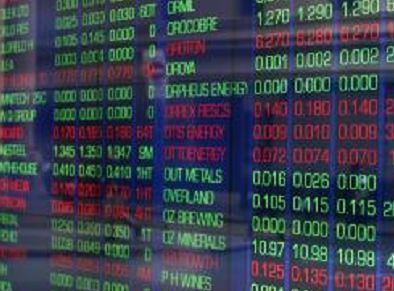
Nigerian equities rose to a two-week high as isolated incidents of violence spurred investors to take advantage of the cheapest stocks in Africa before final results from presidential and legislative elections are tallied.
The advance extended gains over the past seven days to 4.8 percent, taking the Nigerian Stock Exchange All Share Index to its best level since March 16. The measure is still down almost 12 percent this quarter, the most among 24 African gauges tracked by Bloomberg. It is trading at 9.3 times estimated earnings, the lowest on the continent after Zimbabwe.
Investors encouraged by the lack of violence are taking “early positions” should prices rise, Ayodeji Ebo, head of research at Afrinvest West Africa Ltd. in Lagos, said by phone. “They’re cautious, they’re not being very aggressive. But they’re trying to increase their exposure, knowing that if there’s no post-election violence the only direction for the market will be upwards.”
The election, a key test of stability in Africa’s largest oil producer, pitted President Goodluck Jonathan, 57, against a united opposition led by former military ruler Muhammadu Buhari, 72.
This weekend’s vote took place against the backdrop of a six-year insurgency waged by the Islamist militant group, Boko Haram, and a plunge in the price of oil, the country’s main export, which has slowed growth in Africa’s largest economy and weakened the currency.
About 800 people were killed and at least 75,000 forced to flee their homes after Buhari lost elections in 2011. At least 43 people were killed in violent incidents on Saturday, according to provisional data from the Situation Room, a coalition of civil-society groups monitoring the election. Tensions mounted in the key oil-producing Rivers state, where the main opposition party alleged the vote was rigged.
The naira weakened 0.2% to 199.50 per dollar before erasing losses to trade unchanged at 199.05 as of 11:30 a.m. in Lagos on Monday. Yields on the nation’s $500 million of Eurobonds due July 2023 fell 3 basis points to 6.48 percent, the lowest since Dec. 11.
Fitch Ratings cut Nigeria’s credit-rating outlook to negative from stable on Monday, citing falling oil prices and rising political risks.
With a more than 50 percent slump since June in prices for oil, which provides two-thirds of government revenue and 90 percent of foreign income, the naira has lost 18 percent against the dollar in the past six months, the steepest decline among 24 African currencies tracked.
“Political uncertainty is heightened in the context of a tightly contested presidential election and potential transition issues,” Fitch said in a statement, while affirming Nigeria’s B+ rating, three steps below investment grade. “Fiscal and external buffers have been eroded significantly as Nigeria enters a period of lower oil prices.”